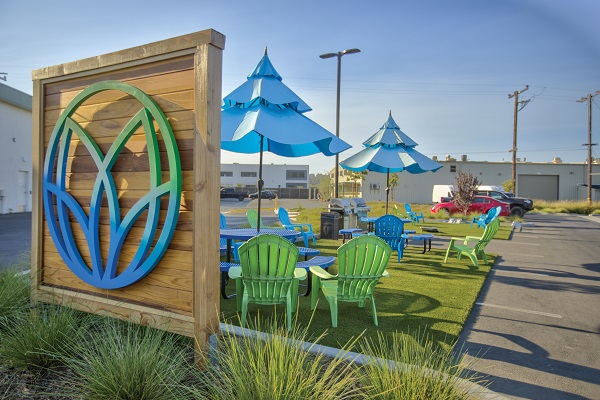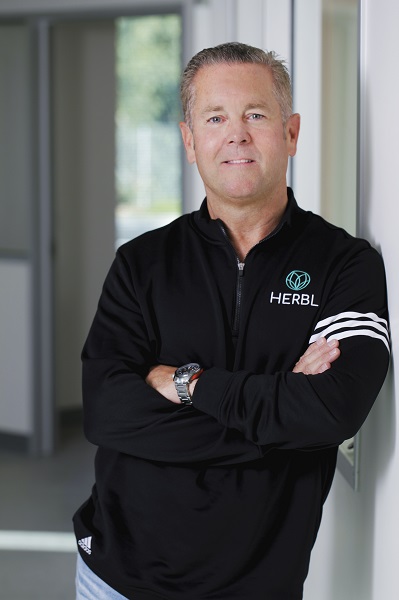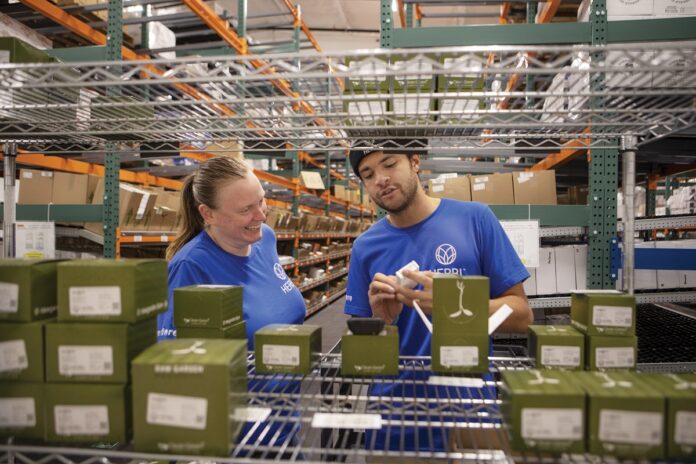HERBL chief executive officer Mike Beaudry clearly remembers the day he saw the true scale of the mountain he and his distribution company had set out to climb. The year was 2018, and HERBL had been operating for a month. His staff unloaded a dozen filled trash bags from a delivery truck into the company’s headquarters, located in Santa Barbara, California. Confused, he asked the team, “Wait, is that loose trim? We’re supposed to get finished goods.”
“No,” they told him. “This is packaged flower. It just comes in trash bags.”
“I was stunned,” said the twenty-five-year veteran of the high-volume grocery distribution game. “That was when I realized as a distributor this early in cannabis, you have to teach backwards and forwards. We have to help our suppliers develop all the disciplines that you need to be a great supplier so we can then be the great support company in the middle.”
HERBL’s credentials as the distributor to develop and impart best practices are impressive. The company’s fleet of thirty-five armored trucks serves more than 850 California retailers with a portfolio of more than twenty-five brands, netting the company $250 million in sales in 2020. Along the way, Beaudry and his team earned a reputation as dependable middlemen, connecting hundreds of small and medium-sized businesses together and relieving the headaches that come with fulfillment in the world’s largest legal cannabis market.
Before HERBL, Beaudry, a Rhode Island native, spent a decade as president of United Natural Foods (UNFI), the nation’s largest distributor of natural and organic foods. During his tenure, the company grew to encompass more than twenty hubs and more than 5,000 staff members; revenue climbed from $500 million to more than $5 billion. Much of HERBL’s executive team came from the dense, well-oiled supply chains of Fortune 500 companies like FedEx and Gap, lured by the challenge of establishing operating standards and gaining vast market share in a dynamic new industry.
But beyond a team of imported distribution specialists, HERBL hired a lot of talent from within the cannabis industry, something Beaudry dubs the “hybrid approach.”

“Early on I realized you can’t bring a bunch of people with a deep background in scaled supply chains without balancing that with people who know how this industry really works—the people who paved the way,” he said. Everyone who works in the field, including his sales team of almost thirty people, must have prior experience in California’s cannabis market. “We definitely didn’t say, ‘Hey let’s pick one of the big drug companies and get their top reps to work here,’” he said. “We all know how that would have worked out.”
Integrating a strong layer of sales into HERBL’s distribution network is one key to the company’s success. A portfolio containing more than 1,000 SKUs, including products from Select, Raw Garden, and Pacific Stone, is among the most impressive in the state, showing a balance of current and future market leaders. Given the low-margin, low-glamor nature of distribution, Beaudry learned early in his career the importance of combining sales and distribution to increase revenue and scale the organization faster.
While HERBL’s portfolio is notable for its large, top-selling names, the company also represents several startup brands it is helping scale into major players. The asymmetrical partnership between small entrepreneurs and gigantic back-end operators is familiar to Beaudry, and it’s in that space his company finds its north star.
“What excited me most about the natural foods industry was the passion of the artisanal brands,” he said. “They deeply believe in what they have created. It’s the same in cannabis. There’s a communal mission founded on the backs of its passionate founders and community. They are key to the industry, and at HERBL they will always have a seat at the table.”
HERBL takes an “assortment architecture” approach to its portfolio, offering retailers popular name brands across all tiers and categories. “We aim to have the right brands in the right categories at the right price points,” Beaudry said.
But beyond the products, HERBL thoroughly vets each brand’s leadership team and the company’s capital position to ensure suppliers actually can produce enough merchandise to supply the entire state. With almost every California retailer on its customer list, HERBL can improve a brand’s exposure overnight, but if a company isn’t ready to go gangbusters it could drown in orders it can’t fulfill.
“We don’t want to lean in as a distributor and then in six months realize [a brand] can’t really scale because it can’t sustain the capital,” Beaudry said.

Being able to achieve and maintain scale is a point of obsession for Beaudry. For him, achieving scale—growing to a point of increased efficiency, increased profitability, and greater competitive advantage—is the primary goal, as it is only then HERBL can overcome the low margins inherent in the cannabis distribution model.
Yet Beaudry and his team are acutely conscious of how challenging maintaining scale is, particularly in the cannabis industry. They know if they want to serve a looming national market, they must build a rock-solid foundation or inevitably they will run into problems.
“Scale breaks everything,” he said. “We knew we had to have something with a deep foundation that could carry the kind of growth we expect. We didn’t want to build something that was serving this year; we wanted to build something that will work long into the future.” He said growth alone won’t work; growth must be paired with a foundation and organization that can support increasing weight. “We had to make sure we could keep growing infinitely and not slow down, and that meant building a foundation that carries a fifty-story building, not a single-story ranch [house].”
With federal legalization looming over the horizon and the company’s foundation and formula nearing completion, expansion to new markets is inevitable. “We are looking for large states that have scale that makes the distributors really important,” Beaudry said. His primary targets are states with unlimited retail licenses and no requirement operators be vertically integrated.
Regardless where HERBL ventures next, the structural preparation the company has undertaken positions it for a legacy role in a national cannabis industry.












